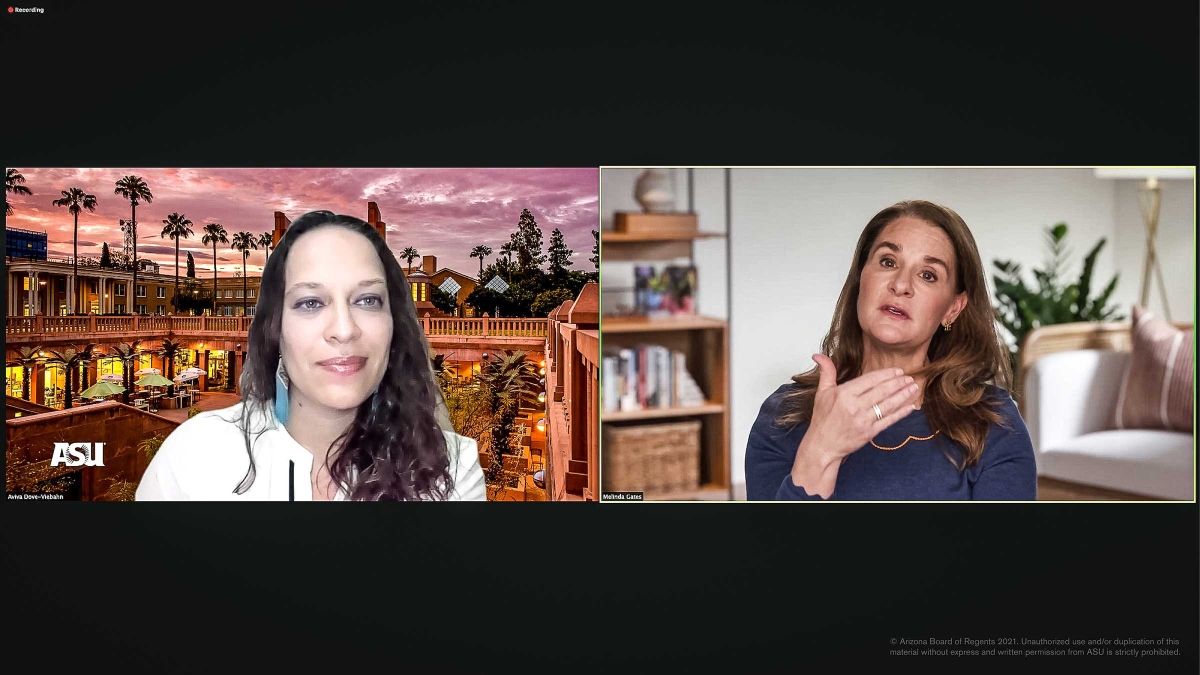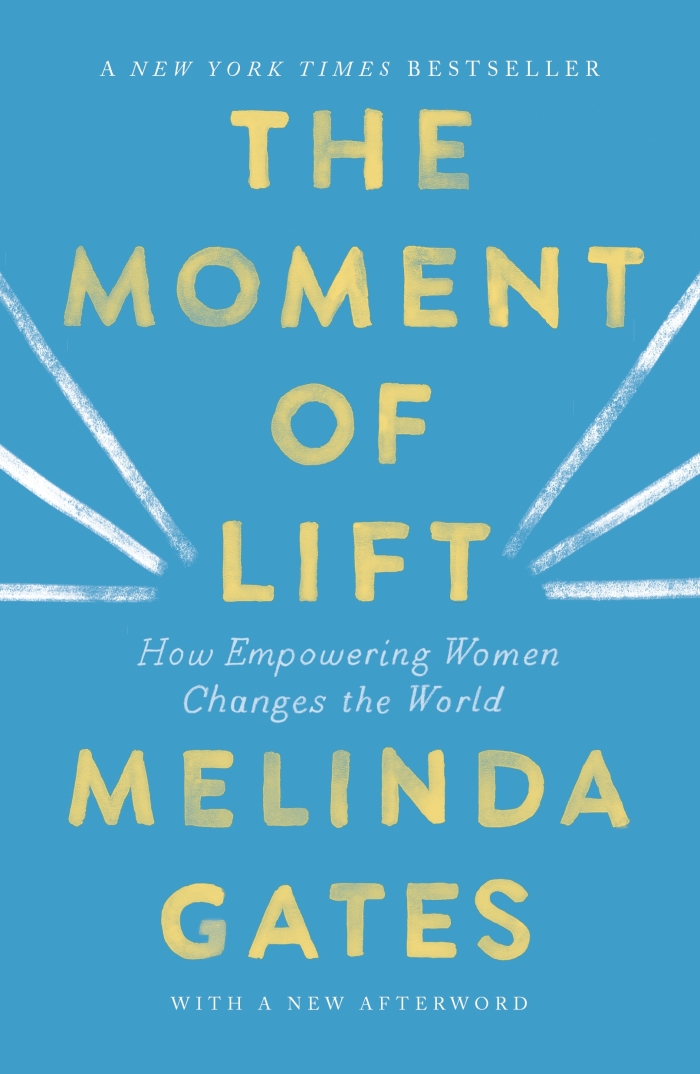If we want to change the world for the better, we’ve got to start by empowering women and girls.
That was the take-home message of a March 18 ASU virtual discussion with Melinda Gates – fittingly during Women’s History Month. The event, hosted by The College of Liberal Arts and Sciences at Arizona State University, was part of a new student engagement initiative called TomorrowTalks, which aims to place some of the world’s foremost thought leaders in conversation with young changemakers, drawing on books they have written as a catalyst for meaningful dialogue.
The initiative launched in February with a discussion of Michael Eric Dyson’s “Long Time Coming: Reckoning with Race in America,” and will continue April 15 with ASU’s own Ayanna Thompson, Regents Professor of English and director of the Arizona Center for Medieval and Renaissance Studies, who will be discussing her book “Blackface (Object Lessons).”
The book up for discussion Thursday night was Gates’ “The Moment of Lift: How Empowering Women Changes the World.” Reviewers of the book range from former President Barack Obama, who called it “powerful,” to human rights activist Malala Yousafzai, who called it “an urgent manifesto for an equal society where women are valued and recognized in all spheres of life.”
A select group of students from The College’s Early Start program were given free copies of the book and prepared questions to ask Gates directly in advance of the event.
“It’s an incredible way for students to engage with real-world writers, thinkers, activists, politicians and public figures, and see that they’re not these inaccessible, faraway people, and that that they are interested in their ideas as up-and-coming leaders,” said Jessica Early, professor of English and director of the Early Start program. “It really demonstrates ASU’s commitment to equity and access, not just to an education at ASU, but also to these amazing people who have so much to share.”
At Thursday’s event, ASU President Michael Crow introduced Gates and thanked her and the Bill & Melinda Gates Foundation “for all you’ve done to help push ASU up the hill.”
“If we don’t think about gender and race in different ways ... if we don’t defeat the notion of inequality, we’ll never realize the full potential of our species,” Crow said in recognition of the main theme of Gates’ book.
Gates relayed how she came to write the book and why eradicating inequality is at the heart of her foundation’s work, explaining that it was through her travels around the world and listening to various women’s personal stories of struggle and hardship that “moved (her)” and “animated (her) life.”
ASU film and media studies Assistant Professor Aviva Dove-Viebahn, who recently landed a screenplay development deal with Women of Color Unite (WOCUnite), served as moderator. Dove-Viebahn asked Gates about her “doctrine of love.”
“I believe in connection between human beings,” Gates said. “When we have connections with others, we can have more empathy for others’ positions and situations. That really is the basis for love and, for me — and hopefully for others — action on behalf of others.”
And paramount to making those kinds of connections is listening. It’s a lesson Gates shared has been reinforced several times through her work with the Bill & Melinda Gates Foundation, particularly in respect to women’s need for contraception.
“The more I listened … it opened my eyes to what women were telling me around the world,” Gates said. “If a woman can’t space the births of her children and decide how many she’ll have, we are locking her in a cycle of poverty.”
Something often taken for granted in the U.S., Gates pointed out, is that the widespread availability of contraceptives has enabled a great many women to pursue higher education and careers of their own.
“(Contraception) is not the only thing, but it’s one of the first things that unlocks empowerment for girls,” she said.
Motherhood affected Gates’ own career when she left Microsoft after the birth of her first daughter so that she could spend time with her child during those crucial early years of life. She still craved a professional life, though, and shortly thereafter, went back to work, this time with the foundation.
But even though Gates was the wife of one of the world’s most powerful men, she was still a woman first, she said; several times during meetings, she told attendees Thursday, leaders would ask a question and look immediately to her husband for the answer.
“I had to learn to speak up early and often,” Gates said.
Turning to the topic of the pandemic, Dovie-Viebahn asked Gates how it has impacted her foundation’s endeavors.
“COVID-19 has stopped a lot of progress dead in its tracks,” Gates said, noting that where poverty had been in decline around the world, it is now on the rise, particularly among women, even in the U.S.
To help to quell the spread of the virus, the Gates Foundation announced in December that it would commit an additional $250 million in support of the research and development of COVID-19 tests, vaccines and treatments, bringing its total commitment to the pandemic response to $1.75 billion. The foundation is also involved in global surveillance measures to prepare for what may come next.
“The world has to prepare for another pandemic,” Gates said. “It’s not a matter of if, but when.”
Her foundation is also invested in educational initiatives and is currently researching better tools and methods for keeping kids on the pathway from K–12 to college. Something Gates finds promising is digital learning, which she gave ASU kudos for spearheading in its own right.
“ASU has been on the forefront … of this digital learning and how you bring people to a campus, no matter their zip code, and get them all the way through college,” she said, adding that “a degree makes an enormous difference” in one’s ability to get a job and contribute to the economy.
When it came time for student questions, applied math undergraduate Phoenix Nelson took the big picture approach and asked Gates how she decides which battles to fight.
“That’s a great question,” Gates said. “One I wrestle with, and one our foundation wrestles with all the time.” She explained that she tries to take a systematic approach, asking questions like, “What are a couple of the biggest barriers that hold women back?” and going from there.
And as far as what advice she would give to her college-age self, Gates had the following to say: “You know more than you think you do. … If you remember who you are and where you want to be in the world, and you don’t forget that, you’re going to be a pretty great adult,” and “Keep learning. Learning does not end at the end of college; learning never ends.”
A recording of Gates’ talk is forthcoming and can be accessed on the Department of English’s YouTube channel.
Top photo: ASU film and media studies Assistant Professor Aviva Dove-Viebahn (left) moderates a talk with philanthropist Melinda Gates on Thursday evening on Zoom. Screenshot by Charlie Leight/© Arizona Board of Regents 2021. Unauthorized use and/or duplication of this material without express and written permission from ASU is strictly prohibited.
More Law, journalism and politics

Veteran journalists Jorge Ramos and Marty Baron talk democracy and free press
Arizona State University hosted "Truth Across Borders," a bilingual panel featuring two of America’s most iconic journalists, last week in the Evelyn Smith Music Theatre on Arizona State University's…
Can elections results be counted quickly yet reliably?
Election results that are released as quickly as the public demands but are reliable enough to earn wide acceptance may not always be possible.At least that's what a bipartisan panel of elections…
Spring break trip to Hawaiʻi provides insight into Indigenous law
A group of Arizona State University law students spent a week in Hawaiʻi for spring break. And while they did take in some of the sites, sounds and tastes of the tropical destination, the trip…



